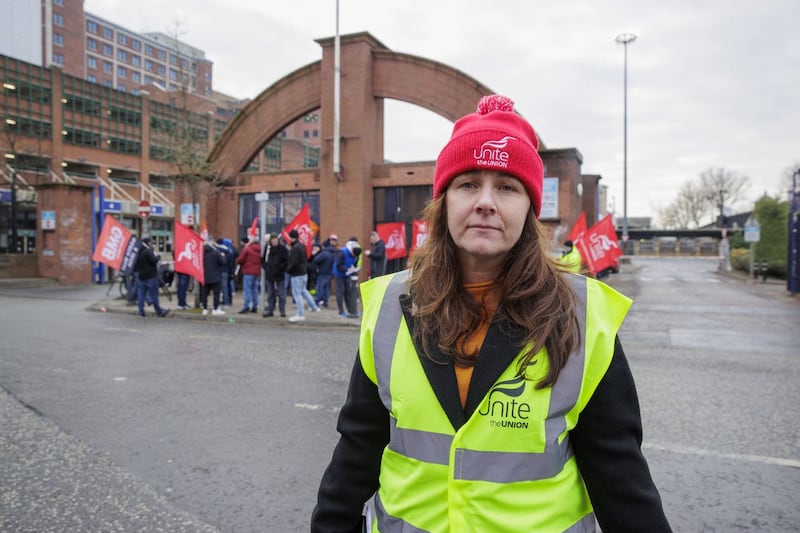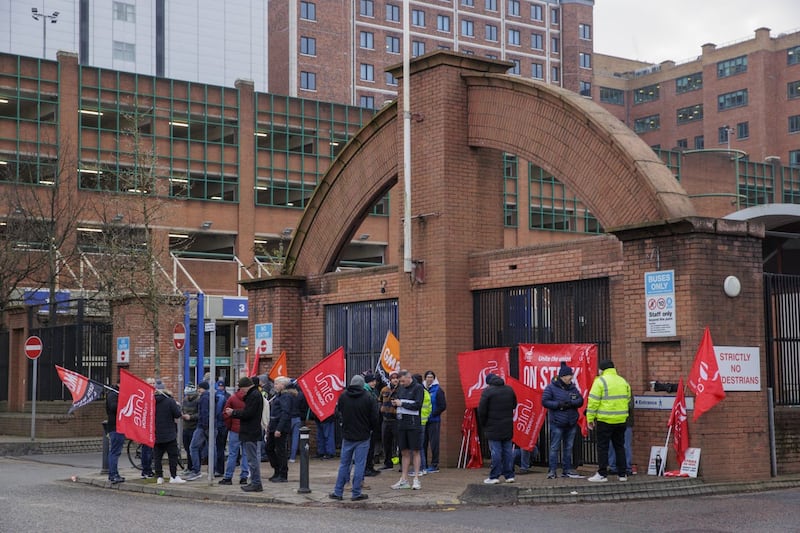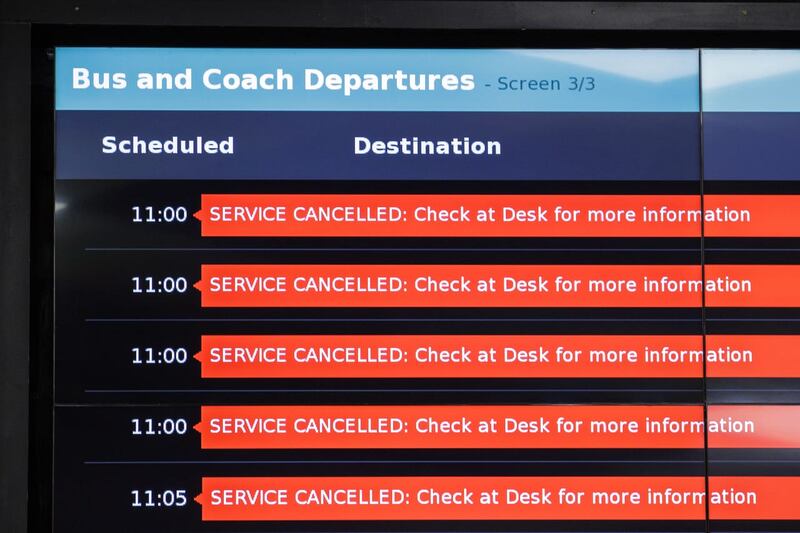Transport and education workers are facing a “debilitating” pay situation, unions have said, as workers across Northern Ireland took part in strike action.
No bus and rail services are expected to be running on Friday during the first public transport strike in eight years in Northern Ireland.
Workers from Unite, GMB and Siptu unions started the 24-hour action at 12.01am in a dispute over pay.
The unions said the workers rejected a pay freeze which they said was equivalent to a 11% real-terms pay cut once RPI inflation is taken into account.

They emphasised that strike action is “always a last resort”, but said their members have been offered no alternative.
Susan Fitzgerald, regional secretary for Unite, was on the picket line at Glengall Street in Belfast on Friday.
“This strike is on the back of being offered a 0% pay increase pay offer this year, which is of course a very significant and debilitating pay cut for workers who, like everyone else, are still struggling through what is quite a profound cost-of-living crisis,” she said.
The unions said there will be a very significant impact from the strike across Northern Ireland, and called on Secretary of State Chris Heaton-Harris to intervene in the absence of a functioning Stormont Assembly to enable workers to receive a cost-of-living pay increase.
Translink, which runs public transport in Northern Ireland, said there will be no train or bus services – Ulsterbus, Goldliner, Metro or Glider – operating on Friday.
Ms Fitzgerald said it was “very regrettable” that working people would experience disruption as a result of the strikes, but that transport workers were bound to take action and will do so again in future if the dispute over pay is not settled.
“The point is our members are being attacked, a pay cut is an attack, and they can’t afford to sit idly by and do nothing,” she said.
“So today is a defensive action, in defence of their living conditions, for themselves and their families.

“And we’d rather not have to do this, but we do have to do it, and if there isn’t movement, it’s likely our members will discuss further days of action.”
Non-teaching school staff were also on strike on Friday.
The Education Authority (EA) said it is expecting significant disruption to school transport in particular, as well as disruption to some school meals and cleaning services.
“The strike action will also have an impact on the availability of classroom assistants which will affect special schools in particular,” the EA said in a statement.
Ms Fitzgerald said the transport workers being on strike on the same day as non-teaching school staff showed that two vital sectors had been pushed to breaking point.
“What does it say that today we have two of the most important groups of workers across our society taking strike action in sub zero temperatures?” she said.
“We have Education Authority workers, people who look after some of the most vulnerable children in our society, who are trusted to look after some of the most vulnerable children in our society.
“They ceased their strike action last year on the basis of getting a pay and grading review that hasn’t been delivered, so our members have been forced to picket line again, in the Education Authority sector, and our members in transport, who keep the whole of society going.
https://t.co/hdPmnzTIeE pic.twitter.com/YjxlfJfCK7
— Education Authority (@Ed_Authority) November 29, 2023
“So if those two groups of workers are being pushed to breaking point what does that say about what workers are facing? And it’s just not tolerable.”
Ms Fitzgerald said the strike action was not just to advocate for workers’ pay but to protect transport services.
“We are looking at the situation here where we have political dysfunction, but the Secretary of State instead of trying to facilitate services, facilitate working people, has engaged in punitive measures,” she said.
“He has launched a series of consultations, proposals to bring in water charges, proposing to cut across the public transport service.
“And that’s actually quite an important point, transport access for disabled people has been threatened, passes for older workers are being threatened.
“Our members are striking today, not just on the issue of pay, but in defence of the vital public transport service.”
In a statement, Translink said it did not receive a budget for a pay offer from the Department for Infrastructure and as such cannot make a pay offer at this time.
“While we understand and recognise the concerns that have led to our trade union colleagues’ decision to vote in favour of industrial action, we have engaged with our unions and reiterated our position,” it said.

“We have urged our union colleagues not to take action which could further exacerbate the financial pressures on Translink, will disrupt services that so many of our passengers rely on, will impact on school children and could damage the livelihoods of many businesses in the retail and hospitality sectors who depend on the busy Christmas period.
“We are communicating relevant passenger information through the media, on our website, through social media, in stations, and on buses and trains. Our contact centre will also remain open (on) 028 90 666 630.
“Translink apologises for any inconvenience this may cause.”
Retail NI chief executive Glyn Roberts and Hospitality Ulster chief executive Colin Neill said they were extremely disappointed and said the action will have an impact on their sectors.
“In our meetings with the trade unions we recognised their right to strike, whilst emphasising the importance of not going beyond the one-day strike this side of Christmas. We would appeal to the unions’ leadership to clarify this situation,” they said.
“Our members of staff will face huge difficulties in getting to their place of work, and likewise our consumers will be restricted in their options to shop and socialise if bus and rail services are not available.
Due to ongoing industrial action, our services will not operate today, Friday 1st December.
Find out more: https://t.co/eDg1xo4Q7g pic.twitter.com/vEl3Lags6s
— Translink (@Translink_NI) December 1, 2023
“Many small independent retailers and hospitality businesses are in survival mode and relying on the Christmas trade to keep their businesses going.
“An agreed way forward on pay is needed and we need real political leadership to do that.”
A Northern Ireland Office spokesperson said: “The UK Government has no authority to negotiate pay in Northern Ireland.
“It is for the relevant NI departments to negotiate pay policies.
“It remains the Secretary of State’s priority to see the return of locally elected, accountable and effective devolved government, which is the best way for Northern Ireland to be governed.
“The Secretary of State has commissioned a range of information and advice from the Northern Ireland Civil Service on potential measures to raise more public revenue, or otherwise to improve the sustainability of public finances in Northern Ireland, for an incoming executive to consider.”








